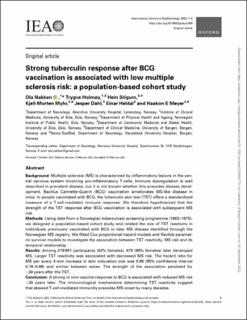| dc.contributor.author | Nakken, Ola | |
| dc.contributor.author | Holmøy, Trygve | |
| dc.contributor.author | Stigum, Hein | |
| dc.contributor.author | Myhr, Kjell-Morten | |
| dc.contributor.author | Dahl, Jesper | |
| dc.contributor.author | Heldal, Einar | |
| dc.contributor.author | Meyer, Haakon Eduard | |
| dc.date.accessioned | 2022-10-03T06:41:16Z | |
| dc.date.available | 2022-10-03T06:41:16Z | |
| dc.date.created | 2022-03-14T14:54:11Z | |
| dc.date.issued | 2022 | |
| dc.identifier.citation | International Journal of Epidemiology. 2022, 1-8. | |
| dc.identifier.issn | 0300-5771 | |
| dc.identifier.uri | https://hdl.handle.net/11250/3023150 | |
| dc.description.abstract | Background: Multiple sclerosis (MS) is characterized by inflammatory lesions in the central nervous system involving pro-inflammatory T-cells. Immune dysregulation is well described in prevalent disease, but it is not known whether this precedes disease development. Bacillus Calmette–Guerin (BCG) vaccination ameliorates MS-like disease in mice. In people vaccinated with BCG, the tuberculin skin test (TST) offers a standardized measure of a T-cell-mediated immune response. We therefore hypothesized that the strength of the TST response after BCG vaccination is associated with subsequent MS risk. Methods: Using data from a Norwegian tuberculosis screening programme (1963–1975), we designed a population-based cohort study and related the size of TST reactions in individuals previously vaccinated with BCG to later MS disease identified through the Norwegian MS registry. We fitted Cox proportional hazard models and flexible parametric survival models to investigate the association between TST reactivity, MS risk and its temporal relationship. Results: Among 279 891 participants (52% females), 679 (69% females) later developed MS. Larger TST reactivity was associated with decreased MS risk. The hazard ratio for MS per every 4-mm increase in skin induration size was 0.86 (95% confidence interval 0.76–0.96) and similar between sexes. The strength of the association persisted for >30 years after the TST. Conclusion: A strong in vivo vaccine response to BCG is associated with reduced MS risk >30 years later. The immunological mechanisms determining TST reactivity suggest that skewed T-cell-mediated immunity precedes MS onset by many decades. | |
| dc.description.abstract | Strong tuberculin response after BCG vaccination is associated with low multiple sclerosis risk: a population-based cohort study | |
| dc.language.iso | eng | |
| dc.title | Strong tuberculin response after BCG vaccination is associated with low multiple sclerosis risk: a population-based cohort study | |
| dc.title.alternative | Strong tuberculin response after BCG vaccination is associated with low multiple sclerosis risk: a population-based cohort study | |
| dc.type | Peer reviewed | |
| dc.type | Journal article | |
| dc.description.version | publishedVersion | |
| dc.source.pagenumber | 1-8 | |
| dc.source.journal | International Journal of Epidemiology | |
| dc.identifier.doi | 10.1093/ije/dyac039 | |
| dc.identifier.cristin | 2009630 | |
| cristin.ispublished | true | |
| cristin.fulltext | original | |
| cristin.qualitycode | 2 | |
